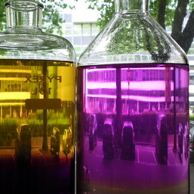It:macro
Appearance
What is a small molecule and what is a large (biological) molecule
Biomolecular polymers including polypeptides, polynucleotides, polysaccharides, and their complexes that meet the following criteria are accepted:
- For polypeptide structures
- all gene products
- all naturally-occurring peptides that are non-ribosomal in origin
- all peptidic repeat units of larger polymers (such as fibrous and amyloid polymers)
- Non-biological synthetic peptides with at least 24 residues within a polymer chain
- Polynucleotide structures of four or more residues
- Polysaccharide structures of four or more residues
Crystal structures of peptides with fewer than 24 residues within any polymer chain that do not meet criteria 1, 2, or 3 can be deposited at the Cambridge Crystallographic Data Centre (CCDC, http://www.ccdc.cam.ac.uk/products/csd/deposit/). NMR structures of such molecules can be submitted to Biological Magnetic Resonance Data Bank (BMRB) through the Small Molecule Structure Deposition (SMSdep, http://smsdep.bmrb.wisc.edu/bmrb-adit/) system. Smaller oligonucleotides (dinucleotides and trinucleotides) can be deposited at the Nucleic Acid Database (NDB, http://ndbserver.rutgers.edu).
